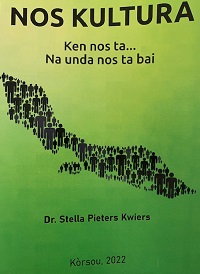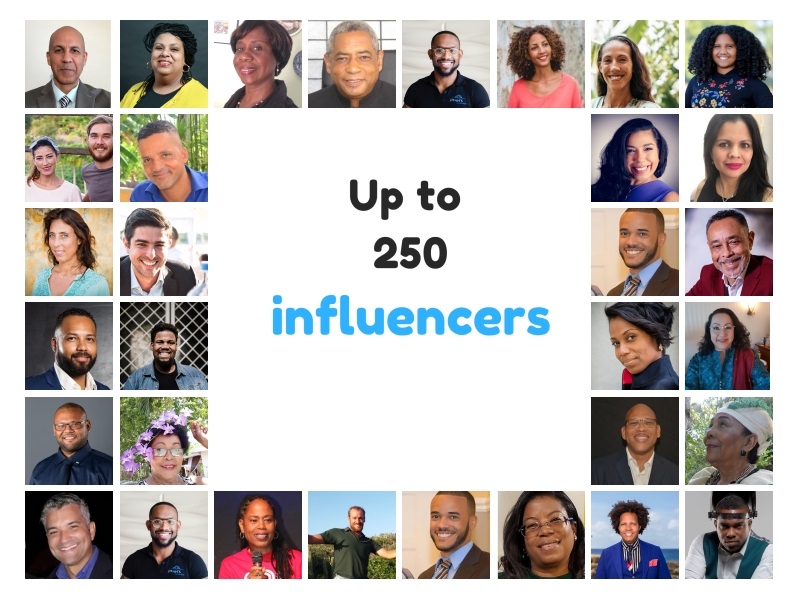Influencer Stella Pieters Kwiers (part 2)
Interview February 2023


Dr. Stella Pieters Kwiers was a senior international researcher employed at the United Nations for many years. Find out more in our 1st interview. In this second interview with Stella Pieters Kwiers we go deeper into aspects of her work and living in Africa, and mental slavery.
When you came back to Curaçao after you have lived and worked in Africa for quite some time what was remarkable in your discussions on Africa in Curaçao and elsewhere in the world?
Africa has been colonized by different European countries and usually, all the key positions in African countries were occupied by white people. Authorities, pastors, and medical doctors were white and this made a big impact on the minds of Africans. During my stay in the Congo, for example, the Congolese used to stand up if they were sitting when a white person (doctor, teacher, nurse) came into a room. When I asked why they did this, they couldn’t give me an answer. It gives you an idea of how deep this conditioning has gone. They were raised like that, as they didn’t know anything else. But if you look at the rest of the world they also are associating Africa and Black people with negative images based on the perception that nothing good comes out of Africa.
In India, I experienced this, when they suggested to me to never marry a black man. When I ask why, I was told that Black men, may be educated but they are not cultured.
This mindset has conditioned us to have an inferiority complex, white people can and black people can’t.
White people are beautiful and Black people are not. In Africa and in many other countries people even bleach their skin to have a lighter skin color.
When I returned from Holland, my father was told that he had “lost all his money”, because none of us, his daughters, got married to a “makamba”.
I have noticed that some of us have also taken over the oppressive mindset of the White man, meaning that some black people are even more oppressive toward those of the same color or that have darker skin. Nowadays, often we don’t pay people that have worked for us what we said we would pay (modern slavery).
Look how some of us perceive Haitians working and living in Curaçao, based on a false sense of “We are the best of the Caribbean”.
Do we still have these negative perceptions of Africa, Africans, and Black people nowadays?
Back in Curaçao talking about Africa was a big taboo and when Africa was discussed it was also associated with these same types of negative perceptions. Unfortunately, we still have this and it is still prevalent. Over the years, I do see that slowly and gradually there are some changes in the world, as we can see that “Black is beautiful” has resulted in Miss World from Trinidad and Tobago, Jamaica and Miss Universe from South Africa where black girls win in these international beauty pageants. Miss South Africa stated that winning the pageant proves that Black people can be successful internationally. That her pro-activity had made her come that far. If she had stayed in the village where she came from, she would never have become successful.
We are seeing that the Black Lives Matter movement has gained momentum, but we also see that we have a long way to go to emancipate ourselves and the rest of the world from racial biases.
We need to empower our people to be proud of themselves and their history…
On the one hand, we need to work on the awareness of our people of their inferiority complex that they are sometimes not even aware of, and on the other hand, we need to work to empower our people to be proud of themselves and their history, this need to go hand in hand. In the end, this will result in a different society. But working on changing people’s mindsets is not something that will have short immediate effects. It will require a long-term approach, but we will have to continue to make people aware and help people change from the inside out.
There is a lot of work to be done and we will need to focus on those that do want to change.
Mental slavery is a very subtle thing, look at a ChiChi- doll, that projects a woman that doesn’t reflect a real woman in Curaçao. Consider that as an example. We need to be aware that we can be biased and that we are not even aware of the fact that we are biased. This makes the challenge all the more challenging.
How would your advice be to free our collective consciousness from mental slavery?
First of all, I think we have to start by re-educating parents and all those adults involved in our educational system, but also all our leaders in the country, union leaders, and leaders in the barrios, to work on changing their mindsets. It needs to also involve adult education and not solely focus on our youth because it will take too long to see the results of these re-education efforts. We need a new educational system, that offers equal opportunities for all;
Secondly, we need to promote Black role models that have achieved great things in the world, like Martin Luther King for example, as role models will inspire others also to aim high and work hard to achieve this. We lack sufficient role models. When I told someone a ‘yu’i Kòrsou’ that I was going to write my first book, this person doubted me instead of encouraging me. He said: “Do you think you can do it? It is very difficult”. I sensed it to be that I as a black woman would not be able to write a book. Today I have written 10 books. We were programmed not to believe in our abilities. We easily say, I can’t. This needs to change.
When it appeared in the newspapers that I was going to work at the United Nations, almost no one in Curaçao congratulated me. The former CEO of the MCB bank was one of the few that did congratulate me. I was fortunate enough to have a father that encouraged me all the way. He would motivate us to aim high and study to advance in this world. My father and Dr. Da Costa Gomez used to say: “We have to compete with the whole world. Because we come from a small island doesn’t mean we can’t confront the whole world”;
Thirdly, we need to teach people what are the root causes that make us super sensitive as black people. We need to raise people’s awareness of this. I have taken notice that there is an undercurrent of anger, hate, and vengeance. Look at the protest on the 24th of June 2020. Where does this come from so suddenly? As I experienced the same thing in Africa, I believe that this is an inter-generational thing, that goes back to the time when people were enslaved. Some parents tell their children that they are not worth a thing (“Bo no ta sirbi pa nada”).
Furthermore, we were not taught to master our emotions. Both factors make us super sensitive and easily feel offended. We need to learn and process these emotions one way or the other.
What would you do today, if you would write your book ‘Nos Kultura’ again?
I would write an additional paragraph on the inferiority complex that is so pervasive and that we need to work on more deeply. I have noticed that although we have patriotism, we lack a feeling of being proud of ourselves. And this needs to be changed. We need to re-program our mindsets and re-invent the beauty in Black people, “Black is beautiful”.
Furthermore, I am more convinced than ever that we need to translate my book ‘Nos Kultura’ into Dutch and English on the demand of many, to offer those who are interested but don’t master Papiamentu, insight into our culture and what I think we need to change. Because of the restoration agenda that has come so prominently on the national agenda since 2022 in the Kingdom of the Netherlands, but also elsewhere, this will contribute to a higher awareness, which is the first step one always has to take, before addressing the issue.
One of the 250 Influencers
We would like to express our gratitude for granting us an opportunity for an additional interview. It takes courage to address Mental Slavery and those aspects of our culture that need to be redressed, as she has mentioned in her book ‘Nos Kultura’. But in Curaçao, people don’t read a lot. Hopefully, by translating the book into Dutch and English, its impact would reach a larger audience and help to enable the necessary changes in our mindsets here in Curaçao and elsewhere in the world. We, by offering Stella this platform, hope that we have contributed a little bit to this highly-needed awareness growth.
The goal of the core group of Share2Uplift for 2023
The goal of the Share2Uplift movement is to: “Identify 250 leaders from all walks of life to connect, align and create impactful changes in all walks of life, which includes intergenerational collaboration by the end of 2023.” We will use interviewing Influencers, meet-and-greet events, “train-the-trainers”-programs on “Emotional Mastery” and “Intentionality “as national intervention strategies, to reach this goal on top of our goal to scale up the possibilities to connect, align and create impact via a virtual platform. We believe that by collaborating with Miguel Goede on the virtual Vision 2030 platform, we will accelerate the possibilities to connect the diaspora and others elsewhere in the world and on the island willing to constructively create impactful changes in Curaçao, to join.
As Share2Uplift, we are fully trying to align with this thinking of Center for Curriculum Redesign to promote this agenda in our educational systems and workplace. So, in that sense, we fully support any initiative to make our educational system 21st-century proof.
Share2Uplift aligners are those that:
– Create an inspiring vision of the future;
– Motivate and inspire people to engage with that vision;
– Manage the delivery of the vision;
– Coach and build a team, so that it is more effective at achieving the vision. These criteria are now being polished.
We also consider these 5 values the most important ones for Share2Uplift aligners. They are:
• Peace from within;
• Compassion;
• Respectfulness;
• Integrity;
• Responsibility.
As we will progress towards this goal, we will update you on the progress.
Personal coaching tips
This week we will share some short videos on Inferiority complexes, Post Traumatic Slave Disorder, Mental Slavery. We will upload one of these videos every day on our facebook.com/share2uplift page.
Symptoms of Inferiority Complex | Causes of Inferiority Complex | Overcome Inferiority Complex – YouTube
Post Traumatic Slave Syndrome. How Is It Different From PTSD? | AJ+ Opinion – YouTube
Inferiority Complex & Superiority Complex: Chasing Wrong Goals | ALFRED ADLER Individual Psychology – YouTube
How to Escape Mental Enslavement – YouTube
Emancipation from Mental Slavery | Dr. Cheryl Tawede Grills | TEDxCulverCity – YouTube
What is Generational Trauma? | Overcoming Traumatic Experiences | #DeepDives – YouTube




